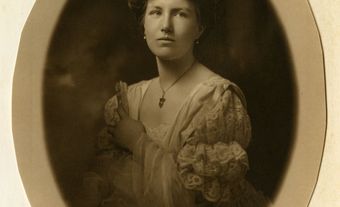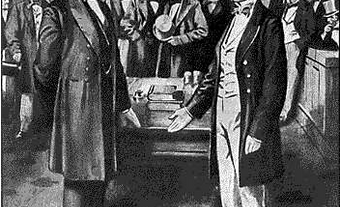James Shaver Woodsworth, Methodist pastor, social worker and politician (born 29 July, 1874 in Etobicoke, ON. Died 21 March, 1942 in Vancouver, BC). First leader of the Co-operative Commonwealth Federation (CCF), he was the best known of the reform-minded Social Gospel ministers and led many of them into the politics of democratic socialism. Woodsworth moved to Brandon, Man, in 1885 where his father became superintendent of Methodist missions in the Northwest. Ordained in 1896, he spent 2 years as a Methodist circuit rider in Manitoba and a further 2 years studying at Victoria College and Oxford.

Observing the grim results of industrial capitalism in Canada and Britain, Woodsworth concluded that his church's stress upon personal salvation was wrong. Moving from middle-class pulpits to a city mission, All People's, in Winnipeg, he worked with immigrant slum dwellers from 1904-13. At the same time he wrote extensively, expounding the "social gospel" - a creedless movement calling for establishment of the Kingdom of God "here and now." By 1914 he had become a controversial supporter of trade-union collective bargaining and an ardent democratic socialist - on Fabian and British Labour Party lines. He was also adamantly pacifist, seeing war as a product of capitalist and imperial competition, and he was fired from a governmental social-research position in 1917 for openly opposing conscription. In 1918 he resigned the ministry in protest against church support of the war. To support his young family he joined a longshoremen's union and worked for a year on the Vancouver docks.
In June 1919 Woodsworth was arrested in Winnipeg and charged with seditious libel for editorials written during the Winnipeg General Strike. Following the arrest of 10 strike leaders on June 17 and "Bloody Saturday," June 21, when a nonviolent protest parade was broken up by mounted police and soldiers, Woodsworth had written about "Kaiserism" in Canada. The case was dropped although the charges, including Woodsworth's citing of 2 relevant verses from Isaiah, were never formally withdrawn. His popularity assured by his role in the strike, Woodsworth plunged with renewed zeal into the organizing work of the Manitoba Independent Labour Party. With a platform modelled on that of the British Labour Party, the ILP succeeded in electing Woodsworth to the House of Commons in 1921 for Winnipeg North Centre, with the slogan "Human Needs before Property Rights." While details of organization and policy would change, Woodsworth's principles remained constant as he held Winnipeg North Centre until his death in 1942.
In Parliament Woodsworth moved a resolution each session calling for replacement of capitalism's competitive profit motive with public and co-operative ownership of the means of production and distribution. Knowing his "co-operative commonwealth" would not arrive instantly, he worked tirelessly to promote immediate changes to benefit those who suffered most under the market system. Vigorously rejecting the shortcut of revolution, and any association with the new Communist Party, Woodsworth became a master of parliamentary procedure and used the Commons as a public platform. In so doing he helped establish a multiparty political system and his own reputation as the "conscience of Canada." He documented the government's hostility to labour; its timorous approach to the League of Nations; its antiquated procedures for parliamentary divorce; its refusal to enact promised social-security measures; and its compliant support of banking and other corporate legislation. In 1926 he demonstrated the worth of the parliamentary process when he bargained his vote (and that of one colleague) in return for a promise from the politically insecure PM Mackenzie King to enact an old-age pension plan. Introduced in 1927, the plan was the cornerstone of Canada's social-security system.
Woodsworth collaborated in the 1920s with a "Ginger Group" of more radical Progressives. When the Depression struck, they joined with various labour and socialist groups to found a federal socialist party. At Regina in 1933 the new party adopted a democratic socialist manifesto and chose Woodsworth as its leader under the banner of Co-operative Commonwealth Federation. By 1935 the CCF had attracted the interest of a number of academics and professionals who joined together in the League for Social Reconstruction and supported both the CCF and the lively political journal Canadian Forum. Woodsworth was the spokesman for these people and for the unionists and farmers who looked to the CCF. Although the 1935 election sent only 7 CCFers to Ottawa, that little group included such political dynamos as T.C. Douglas, and the party had become the official opposition in both BC and Saskatchewan.
For Woodsworth the tragedy of the Depression was increasingly overshadowed by the impending horror of WWII and he gave his attention to Canada's international position. Inside the CCF he faced the growing concern of some of his colleagues that Hitler's threat could only be met by force. Believing that war breeds only war he strove to persuade the government to declare Canada's right to neutrality. He failed, as he did in the CCF National Council in Sept 1939 which gave limited support to a Canadian declaration of war. "M.J."Coldwell stated the official CCF position in the special parliamentary session while Woodsworth was permitted to explain his dissent. Reviewing the interwar period and repeating that war settles nothing, Woodsworth declared: "I rejoice that it is possible to say these things in a Canadian parliament under British institutions. It would not be possible in Germany, I recognize that ... and I want to maintain the very essence of our British institutions of real liberty. I believe that the only way to do it is by an appeal to the moral forces which are still resident among our people, and not by another resort to brute force." He alone rose to record his opposition to the declaration of war. In 1940 Woodsworth won his last election with a sharply reduced majority. He was already weakened by a stroke and died in the spring of 1942.

 Share on Facebook
Share on Facebook Share on X
Share on X Share by Email
Share by Email Share on Google Classroom
Share on Google Classroom


